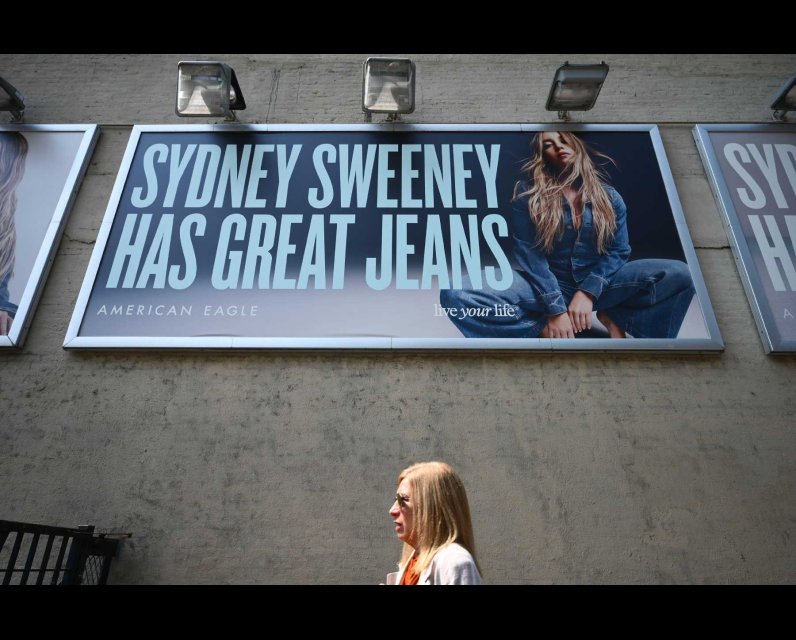Sydney Sweeney, Cracker Barrel, and the Culture War That Won’t End

Throughout the culture war flareups of the last fifteen years or so, liberals and conservatives have periodically traded fire over matters that are fundamentally symbolic and often negligible to meaningless at the level of actual political substance. In their own different (and often quite cynical) ways, both factions have been adept at converting cultural issues into the language of political grievance and, in turn, into supposed forms of political engagement—and even activism—that have often amounted to little more than new kinds of shopping or media consumption.
In retrospect, much of this stuff seems even more ridiculous now than it did at the time. And, without rehashing the by now well-worn left-wing critique of it—that cultural consumption isn’t politics; that political elites deliberately retreat to cultural terrain to skirt more substantive political and material issues, etc.—that view very much still applies. Nonetheless, in the heady days of the 2010s, when, among other things, social media was still relatively new, plenty across the ideological spectrum did, by all appearances, earnestly ascribe real political weight to these sorts of controversies.
There has always, of course, been a fair share of cynical opportunism at work too. Political elites who functionally agree on the basic contours of the system as a whole need endless fodder for their partisan spectacle. Cable networks and engagement-farming websites similarly need their eyeballs and their clicks, and where better to find them than in endless cycles of quasi-manufactured outrage over the shows and ads people happen to be seeing on TV or the cereals they are choosing to eat for breakfast?
At its core, however, liberal and reactionary culture warriors share one fundamental premise in common: namely, the belief that politics is ultimately downstream from culture, and consequently, that the likes of the media people consume and the places they shop represent important and consequential sites of political struggle. For the right’s part, there has sometimes been a weirdly psychosexual dimension to this belief (case in point: Tucker Carlson’s anguish over the supposed desexualization of green M&Ms). For liberals, it has often tended more toward the shallow transposing of quite legitimate political demands (e.g., for racial justice or for greater social inclusion) into market logics.
Some might disagree, but in both cases, my sense is that this kind of cultural politics—notwithstanding its partially top-down nature—once had plenty of honest buy-in from below. And I don’t think it’s hard to see why. Whatever our political persuasion happens to be, the fact is that most of us feel pretty powerless when it comes to affecting any sort of profound political change in the societies that surround us. Politics, which is to say politics of the actual kind, feels increasingly sclerotic, while political power itself feels evermore distant and abstract. There’s thus a quite natural instinct, I think, to retreat to terrain where we have a surer footing and can experience a greater sense of agency and control. In this respect, our consumption habits and cultural tastes are obviously prime candidates.
Without being too definitive here, however, it’s my strong sense that this phase of the culture war is increasingly running on fumes—if only because the same things have been incessantly invoked and weaponized to the point of near total dullness. Again, I think political persuasion is largely irrelevant. When the same big red button has been smashed again and again and again, there are bound to be diminishing returns, regardless of the ideology or audience.
Which at last brings us to the latest symptom of culture war exhaustion, namely the thoroughly astroturfed controversy over the American Eagle ad campaign featuring actress Sydney Sweeney. If you somehow managed to escape this particular flare-up, it ostensibly emerged thanks to mass progressive outrage about the phrase “Sydney Sweeney has great genes jeans,” which legions, or so you may have read or heard from various outlets, took to be a racist dog whistle with eugenic subtext. The rub is that, despite eliciting public comment from the president and vice president of the United States and at least one member of the Senate, nothing of the kind actually happened.
From the first tweet I saw alerting me to all this, I immediately smelled a rat. No doubt plenty of others did too. This isn’t, I stress, because social media is universally free of self-identified progressives who are above making such a ludicrous claim about an innocuous advertising campaign. (I see no need for anyone to feel defensive in conceding this, by the way. There are quite literally billions of people on social media, and among them you will find every single goofy belief, grievance, and concern under the sun.) Regardless, the whole story positively screamed of something inorganic and reverse-engineered. And, sure enough, that hunch has now been empirically confirmed in an analysis by Ken Bensinger and Stuart A. Thompson over at the New York Times.
Here’s the crux:
“Criticism of the ad campaign had come almost entirely from a smattering of accounts with relatively few followers, according to an analysis of social media data by the New York Times. Conversation about the ad did not escalate online or in traditional media until days later, after right-leaning influencers, broadcasters, and politicians began criticizing what they described as a wave of progressive outrage.
In fact, by the time right-wing users were in an uproar, only a few thousand posts on X mentioned Ms. Sweeney, according to data by Tweet Binder, a social media analytics company. Fewer than 10 percent of those expressed clear criticism of the actress or ad, according to the analysis by the Times, which used artificial intelligence to help flag posts for review. Overall, there were three times as many posts supportive of the campaign and Ms. Sweeney on X as there were posts critical of them in the days after the campaign began, the analysis by the Times showed.”
The caveat, of course, is that by willing the whole micro-controversy into being in the first place, the right’s media echo chamber did ultimately inspire some people to criticize the ad.
A further, and arguably even more absurd symptom of culture war exhaustion presented itself more recently in the Fox News-led moral panic around an attempted corporate rebrand at Cracker Barrel. In the Sweeney faux-controversy, stupid and astroturfed as it was, you can at least see what the right’s grift machine was trying to do. Here, you have to squint and use a giant magnifying glass to even figure out what’s gotten some conservatives so outraged, and even then, the whole thing strains credulity. Getting emotionally invested in corporate iconography is silly enough in and of itself. But the assertion that Cracker Barrel’s attempted logo change represents an instance of “woke-ification” is so gobsmackingly ersatz it feels like the right’s culture warriors are barely trying anymore. And in “victory”—earlier this week, the company announced it would bring back its original branding—their cause looks even more vacant. Becoming politically enraged over the signage at Cracker Barrel is embarrassing enough. Hailing the restoration of its old iconography as some kind of political win is proof positive you’ve forgotten what real politics is.
If nothing else, both episodes suggest the incentive structures—political, monetary, technological, and otherwise—that birthed the 2010s culture war still very much remain in place. But the actors involved are now simply going through the motions: reading from an exhausted script to a theatre that looks increasingly empty.
Perhaps, a half-decade or so into the 2020s, the 2010s have finally come to an end.
Adapted from “The Culture War is Completely Exhausted” by Luke Savage (Substack). Reprinted with permission of the author.
The post Sydney Sweeney, Cracker Barrel, and the Culture War That Won’t End first appeared on The Walrus.



Comments
Be the first to comment